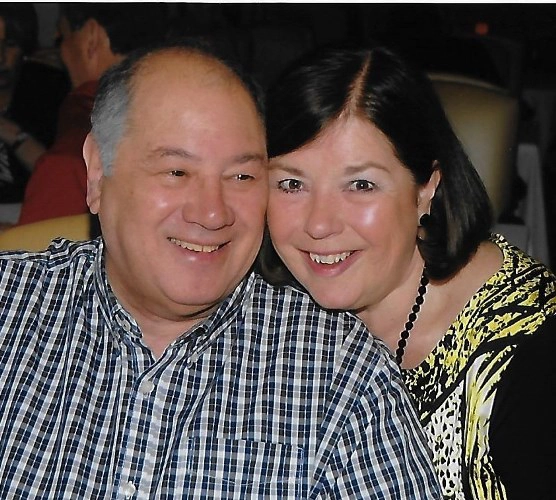
Together they visited many far flung corners of the world - until a year ago when Bob, 71, was diagnosed with a rare brain disease, which curtailed their much-loved trips abroad and meant Brenda became his full-time carer.
Following a Carer’s Assessment, Brenda, 63, took part in The Hospice of St Francis’ Care Towards the End of Life Course and Practical Caring Course, both of which gave her helpful tips and advice on her new carer’s role.
Here she tells her story…
“It was on a trip to New Zealand, after the death of my first husband, that I met Bob. We got married and I moved from the West Midlands to our new house in Wigginton.
“When Bob retired in 2006, he started volunteering for the Hospice Lottery, selling tickets at local events. It was in this capacity that we got to know The Hospice of St Francis as we would occasionally visit for meetings and lottery draws. Being relatively new to the area it was a great way to meet people, use our skills for the good of the local community and have fun at the same time.
“But 12 months ago Bob was diagnosed with Progressive Supranuclear Palsy (PSP), a rare brain disease which affects only around 4,000 people in the entire country. It isn’t hereditary, it isn’t linked to lifestyle - it is just bad luck.
“The condition affects balance, mobility, vision, speech and swallowing and Bob fell backwards several times. At first the doctors thought it was something to do with messages from the heart to the brain missing a beat so he was fitted with a pace maker!
“He began getting double vision and I noticed his eyes weren’t moving properly. The Optician couldn’t understand it and referred us to a specialist eye doctor, who in turn referred us to a Neurologist. He took one look at Bob and knew straight away what was wrong. He said it’s not good news, it is life-limiting, so if there’s anything you want to do you should do it now.
“It came as a complete blow. We didn’t know how long he had left or how it was going to go, we just had to get on with it.
“One of the most shocking things about the disease is that it causes Bob to fall over backwards suddenly and without warning. Herts Care arranged for him to wear an alarm on his wrist, which alerts them if he falls at home when I’m not there and allows me to pop out for a couple of hours.
“When I realised the situation and what it meant, I asked our GP for a referral to The Hospice of St Francis. Bob had said he didn’t want to die at home because he didn’t think it was fair on me.
“When we first came to the Hospice, as well as arranging support for Bob from the Community Nursing Team, I underwent a Carer’s Assessment, using the Carers Support Needs Assessment Tool, which looked at what support I may need as Bob’s carer. I was concerned about what would happen to Bob if something happened to me while I was out and I couldn’t get back to him. I needed to make sure something was in place and, as a result, I now carry a card that identifies me as Bob’s carer. It means someone would be there to care for him if for any reason I couldn’t. This has given me enormous peace of mind and I find that very reassuring.
“I also attended the Hospice’s six-week Care Towards the End of Life Course, which gave me the chance to meet other people in a similar situation. It was useful to hear other people’s experiences and gave me an insight into what the journey as a carer might look like and what help was available. We were given information on legal matters and funeral planning as well as focusing on our wellbeing as carers.
“Since then I’ve taken part in a Practical Caring Course, which looks at the practicalities of caring for someone with a life-limiting illness and provided useful tips on day to day things like back care and how to manoeuvre someone when they’re in bed.
“Knowing there is always someone there I can ask for help or advice and that I am not alone as I face the future and as Bob’s illness gets progressively worse is hugely reassuring. When Bob said he didn’t want to die at home, the Hospice was the first place I thought of.
“Because I was widowed in my 40s I have an attitude that life’s too short, so when Bob was diagnosed we drew up a bucket list of places we wanted to go to while we still could, so that’s what we’ve done. We’ve been on a river cruise down the Danube, to Norway to see the Northern Lights, we’ve had a helicopter ride over Mount Cook in New Zealand and an elephant ride while on safari.
“I always try to make sure that Bob has something to look forward to. We’re making sure we do all the things we want to do while we still can.”






Share Article